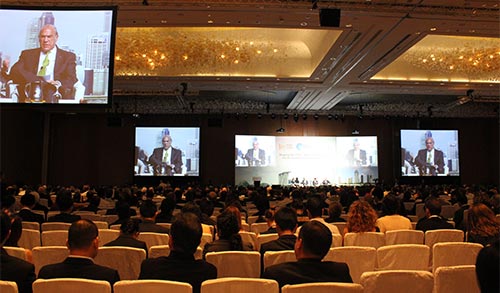Siemens committed to build a greener world

Themed “Liveable and Sustainable - Common Challenges, Shared Solutions”, the event is home to thousands of participants from many nations around the world who discuss solutions to cities threatened by energy shortages and needing to apply eco-friendly solutions and technologies.
“Year by year, cities have grown in importance in countries around the world. Urbanisation is proceeding at an unprecedented scale. In the two years since our last summit here, more than 100 million people have moved into cities from the countryside. And that’s equal to 20 Singapores,” said Singapore’s Prime Minister Lee Hsien Loong, as guest of honour of the event, who reminded attendees of the challenges the world faces in tackling sustainable growth.
Singaporean Minister of National Development Khaw Boon Wan told the summit that the combat against climate change and ensuring sufficient resources for cities were the task of not only governments, but also enterprises and investors.
Siemens also said it was committed to contributing to the world’s efforts to create green energy via its state-of-the-art energy-saving solutions and technologies.
The Siemens Infrastructure & Cities Sector with approximately 90,000 employees, focuses on sustainable and intelligent infrastructure technologies. Its offering includes products, systems and solutions for intelligent traffic management, rail-bound transportation, smart grids, power distribution, energy efficient buildings, and safety and security. The sector comprises the divisions Building Technologies, Low and Medium Voltage, Mobility and Logistics, Rail Systems and Smart Grid.
“Infrastructure is the backbone of our cities. It moves people and goods, it powers our lives, and it drives growth. Be it a reliable transport system, electrical grids that provide dependable energy supply, or buildings that offer space for housing or commerce: safe and efficient infrastructure is the base on which an economy is built,” said Roland Busch, CEO of Siemens Infrastructure & Cities.
“Yet across the world, infrastructure systems are coming under increasing pressure due to unprecedented urbanization, continued globalization and the effects of climate change. Between now and 2030, an estimated minimum of $50 trillion in infrastructure investment will be required to fuel global development. The scale of the challenge calls for a new, more intelligent approach to infrastructure,” said Roland Busch, chief executive officer of Siemens Infrastructure & Cities.
He said that the solution was not just to build a new power grid or replace an ageing railroad. Today’s societies needed solutions that involved getting more out of the infrastructure we already had and developing new, ground-breaking, infrastructure systems that could tackle the challenges of the future, ultimately reinventing how societies function. “What we need is intelligent infrastructure that optimizes energy generation, improves healthcare systems, makes buildings smarter, and keeps traffic flowing.”
What the stars mean:
★ Poor ★ ★ Promising ★★★ Good ★★★★ Very good ★★★★★ Exceptional
Latest News
More News
- State corporations poised to drive 2026 growth (February 03, 2026 | 13:58)
- Why high-tech talent will define Vietnam’s growth (February 02, 2026 | 10:47)
- FMCG resilience amid varying storms (February 02, 2026 | 10:00)
- Customs reforms strengthen business confidence, support trade growth (February 01, 2026 | 08:20)
- Vietnam and US to launch sixth trade negotiation round (January 30, 2026 | 15:19)
- Digital publishing emerges as key growth driver in Vietnam (January 30, 2026 | 10:59)
- EVN signs key contract for Tri An hydropower expansion (January 30, 2026 | 10:57)
- Vietnam to lead trade growth in ASEAN (January 29, 2026 | 15:08)
- Carlsberg Vietnam delivers Lunar New Year support in central region (January 28, 2026 | 17:19)
- TikTok penalised $35,000 in Vietnam for consumer protection violations (January 28, 2026 | 17:15)
















 Mobile Version
Mobile Version